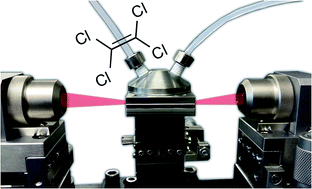Sensing chlorinated hydrocarbons via miniaturized GaAs/AlGaAs thin-film waveguide flow cells coupled to quantum cascade lasers
Abstract
Mid-infrared (MIR) sensors based on attenuated total reflection (ATR) spectroscopy provide robust, rapid and sensitive platforms for the detection of low levels of organic molecules and pollutants. Nowadays, MIR (3–15 μm) spectroscopy has evolved into a versatile sensing technique providing inherent molecular selectivity for the detection of organic and inorganic molecules. The excitation of vibrational and rotational transitions enables the qualitative and quantitative analysis of molecular constituents in solid, liquid, and vapor phases, which facilitates the application of MIR chem/bio sensors for on-site environmental analysis in scenarios such as trace pollutant monitoring or spill detection. This report presents the first integration of thin-film gallium arsenide/aluminum gallium arsenide (GaAs/AlGaAs) into a miniaturized liquid flow cell designed for continuous trace analysis of chlorinated hydrocarbons (CHCs) in water coupled to a broadly tunable quantum cascade laser (QCL), which facilitates in-field deployment of QCL-based sensing devices ensuring water quality and water safety.

- This article is part of the themed collection: Portable instrumentation & point of care technologies

 Please wait while we load your content...
Please wait while we load your content...